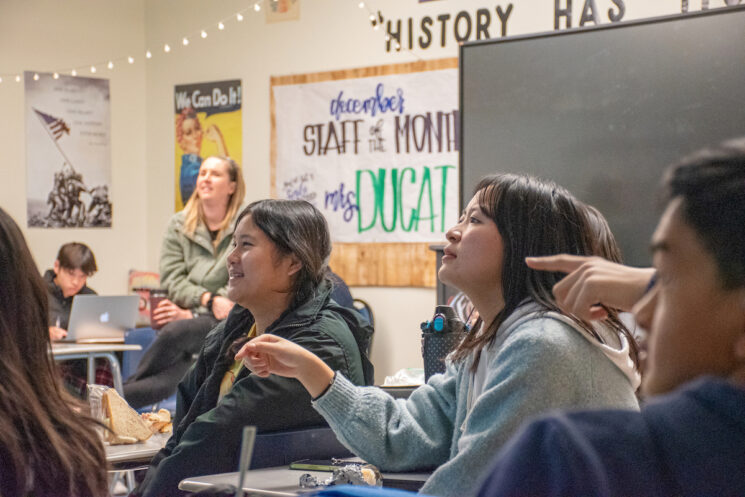
By Uy Pham and Rebecca Do
FULL DISCLOSURE: Uy Pham and Rebecca Do are currently board members of the Model United Nations club.
Beginning in the 2023-2024 school year, Fountain Valley High School (FVHS) students will have the option to select the Honors/MUN (Model United Nations) pathway as an alternative choice for their social science education. The other options for students will be the Advancement Placement (AP) pathway and the general history pathway.
The pathway is expected to begin freshman year and end senior year, giving students their needed A-G graduation credits alongside the opportunity to prepare for and participate in Model United Nations conferences.
The classes within the pathway include “World Geography Honors/MUN” for freshmen, “World History Honors/MUN” for sophomores, “US History Honors/MUN” for juniors and “US Government/Economics Honors/MUN” for seniors. Unlike the other pathways, the same teacher would instruct both the government and economic semesters for students in the MUN pathway.
“It’s always something we’ve thought about bringing into the department. After COVID, there were a lot of teachers excited to do something different,” history teacher Michael Kral said. “[The students are] very academically driven… [MUN] seemed like a natural fit and wouldn’t take away from other pathways [FVHS] has created.”
Model United Nations presents the opportunity for students to act as delegates and represent one of 193 member states of the United Nations. At various conferences hosted by high schools and colleges, delegates focus on a particular issue to debate in a simulation of one of the United Nations’ many committees.
With the goal of addressing the issue at hand, delegates work with the other students in their committee to debate, develop and draft solutions that they present as resolution papers. At the end, the committee votes on the resolutions and delegates may be recognized for their achievements in the committee through awards.
“We get to learn about the real world, real-time problems… [and] expand our knowledge of issues, problems, cultures, languages and country relationships,” history teacher Kelly Ducat said. “Then, we go and debate with an arsenal of country policy and history to try and create creative meaningful solutions to problems.”
Although MUN existed as a curricular club on campus in previous years, the future goal always included the development of a MUN class. As a product of the MUN program at Edison High School and current advisor of the club at FVHS, Ducat has witnessed first-hand the benefits of the program compared to a club.
“I see how successful the other programs are, how competitive and better prepared the students are mostly because they’re being awarded credit,” Ducat said. “As awesome as our students are, [currently] it’s all on their own time. If the space is created to receive feedback and peer edits, [MUN] is so much more valuable as a class.”
Beyond becoming a more informed global citizen, students will also be able to further their personal skills of collaboration, research and public speaking.
The MUN club on campus prepares students for conferences during bi-weekly meetings at lunch. The MUN curriculum and lesson plan has not been determined yet, but the class will definitely provide more time for both core history content and MUN instruction compared to the club.
“One day, it will be the history of the United Nations and then tomorrow it will be learning about different country policies. If we model it directly after other programs, [there would be] MUN Mondays, where Mondays is where we learn about and do our MUN stuff, and then Tuesday through Friday is the core content,” Ducat said.
The participation requirement for students in the program will be two conferences per semester. Although the number of conferences available per semester has not been determined, students will have multiple opportunities to attend conferences and meet the requirement.
Regarding conference performance, teachers have yet to determine whether students will receive a grade based on performance in their committee. However, students will be graded on their research and writing work in preparation for conferences.
Like with many other on-campus programs, donations will cover costs for the MUN pathway; students will be recommended to pay approximately $150 to $200, mainly towards conference costs.
As opposed to regular AP (Advanced Placement) classes, the Honors/MUN pathway will not prepare students for a standardized test at the end of the year. However, students can still opt to take the exams.
“If students choose to, the advantage is that so far the MUN teachers are also the AP teachers,” Ducat said. “We can help prepare those students, if they elect to take the exam. We have the materials and experience to help, but the class itself would not be guided to take the [AP] exam.”
The MUN programs at Huntington Beach High School and Edison High School have hosted well-respected advanced-level and novice-level conferences for decades, attracting visiting delegates from around the world.
If funding allows, both Ducat and Kral hope to eventually host a conference at FVHS in partnership with various local vendors.
“It’s been a rocky road of trying to create [this program] for the last five years,” Ducat said. “Finally, there’s an opportunity to do it and we’re all really excited about it.”
Those who are interested should select the Honors/MUN class for their grade level when guidance counselors ask for course requests. Any questions should be directed towards Assistant Principal of Guidance Rachel Kloppenburg at rkloppenburg@hbuhsd.edu or MUN Club Advisor Kelly Ducat at kducat@hbuhsd.edu.





